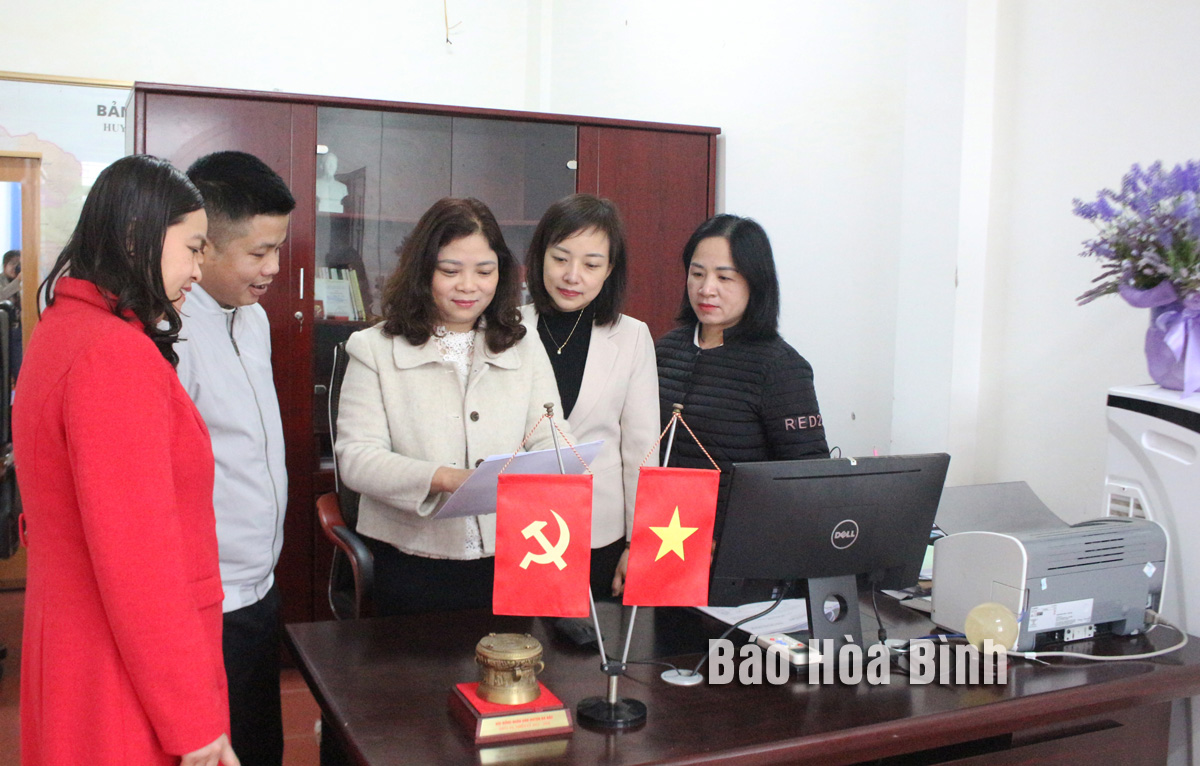
By mid-February, Da Bac district completed a plan to streamline its organisational apparatus and personnel work, marking a milestone in efforts to promote restructuring towards a leaner, more efficient organisational system, closely following directives from the Party Central Committee’s Resolution No. 18-NQ/TW, and Conclusion No. 121-KL/TW, and Resolution No. 27-NQ/TU of the provincial Party Committee and Conclusion No. 1103-KL/TU by the provincial Party Organisation’s standing board.
The Department of Information and
Education, and Mass Mobilisation of Da Bac district assigns tasks to cadres and
civil servants to ensure work efficiency immediately after re-organising the
apparatus.
Duong Thi Thuy, who was assigned as Head of the
Da Bac district Party Committee's Department of Information and Education, and
Mass Mobilisation, and concurrently serves as Director of the district
political centre, said as soon as receiving the decision to re-organise the
organisational structure, the department promptly got to work.
The department held meetings to discuss plans
for implementing tasks, and assign specific tasks to each officer and public
servant, ensuring that the right person is placed in the right role, fully
leveraging their capabilities, and preventing any issues that might affect work
efficiency and effectiveness.
The department’s new apparatus is expected to
operate actively and effectively, and well perform assigned tasks, thus
contributing to the locality’s development.
After one and a half months (from January 1 to
February 14, 2025) of urgently, seriously, and decisively implementing the
directives from the Party Central Committee and the provincial Party Committee
regarding the re-organisation of the political system, Da Bac district
announced decisions on the re-arrangement and personnel works.
Accordingly, the district completed the
consolidation of the district Party Committee’s Information and Education
Department and the Department of Mass Mobilisation into the Department of
Information and Education, and Mass Mobilisation; dissolved five party cells and
established three new ones. Nine district-level Steering Committees have ceased
operations, while two steering committees have been merged. To date, the total
number of state-staffed employees has decreased by 16.7% compared to 2017.
From 2017 to December 2024, Da Bac district also
earnestly implemented the Party’s directives and resolutions on reorganising
the political apparatus, and downsising the workforce.
The re-organisation and streamlining of the
political apparatus have contributed to reducing recurrent expenditures by
about 12 billion VND per year, thereby providing the district with additional
resources for development investment. In addition, the administrative apparatus
now operates more efficiently with reduced overlap and enhanced accountability
among officials. The quality of personnel has improved, and the average time
required to process administrative procedures for citizens and businesses has
been reduced by 15–20%.
The pilot implementation of several integrated
models aims to streamline the state apparatus, enhance operational efficiency,
reduce management focal points, simplify decision-making processes, and boost
coordination among agencies with similar functions.
Dual role assignments help reduce the number of
officials in leadership positions, strengthen individual accountability, and
decrease the tendency to avoid responsibility. As a result, policies are
implemented more coherently, avoiding overlaps among relevant agencies.
In the spirit of "Party members go first, the people follow”, all households of Party members in the Doan Ket sub-region in Da Bac town, Da Bac district, voluntarily removed gates and fences, and donated land when the road expansion project passed through their properties. Inspired by their example, 68 households in the sub-region quickly followed suit, contributing over 1,400 sq.m of residential and perennial cropland to widen the main road through the residential area. The exemplary role of Party members in Doan Ket stands as a shining example of studying and following President Ho Chi Minh’s thought, morality, and lifestyle.
The Hoa Binh provincial People's Committee held a monthly meeting on May 29 to assess the implementation of socio-economic development tasks in the first six months of 2025, the progress of key projects, and some other important issues.
During his lifetime, President Ho Chi Minh always expressed his deep affection and special concern for children and youth. He once emphasized: "Caring for and educating children well is the responsibility of the entire Party and the entire people”; "First of all, the family (i.e. grandparents, parents, siblings) must do this job well”. "the Party Committees…, the Children’s Committee, the Youth Union, the education sector, and all related organizations must have specific plans to ensure children grow healthier and more progressive”. His teachings has been remaining valuable and serving as the guiding principles in the work of protecting, caring for, and educating children. In line with this ideology, Hoa Binh Province has continuously been prioritizing and investing resources in the well-being of children in recent years.
Mr. Nguyen Phi Long, the alternate Member of the Party Central Committee and Secretary of the Provincial Party Committee chaired the meeting of the Standing Committee of the Provincial Party Committee to provide opinions on several investment projects within the province. There was the attendance of Ms. Bui Thi Minh, the Permanent Deputy Secretary of the Provincial Party Committee and Chairwoman of the Provincial People’s Council; Mr. Bui Đuc Hinh, the Deputy Secretary of the Provincial Party Committee and Chairman of the Provincial People’s Committee and other members of the Standing Committee; the leaders from other departments, agencies, and some localities.
The Standing Board of the Vietnam Fatherland Front (VFF) Committee of Hoa Binh province held a meeting on May 28 to honour outstanding village elders, village heads, and reputable individuals from local ethnic minority and religious communities.
In mid-May, the provincial Museum organised an exhibition named "Duoi la co Dang Cong san Viet Nam quang vinh” (Under the flag of the glorious Communist Party of Vietnam). This meaningful activity took place in the joyful atmosphere to celebrate the country's major holidays and the Party congresses at all levels for the 2025-2030 term, towards the 14th National Party Congress.



